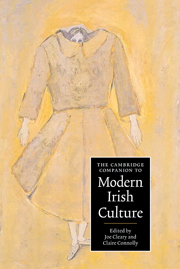Book contents
- Frontmatter
- 1 Introduction: Ireland and modernity
- Part I Cultural politics
- 2 The survival of the Union
- 3 Language, ideology and national identity
- 4 Religion, identity, state and society
- 5 Republicanism, Nationalism and Unionism
- 6 Irish feminism
- 7 Migration and diaspora
- 8 The cultural effects of the Famine
- Part II Cultural practices and cultural forms
- Index
6 - Irish feminism
from Part I - Cultural politics
Published online by Cambridge University Press: 28 May 2006
- Frontmatter
- 1 Introduction: Ireland and modernity
- Part I Cultural politics
- 2 The survival of the Union
- 3 Language, ideology and national identity
- 4 Religion, identity, state and society
- 5 Republicanism, Nationalism and Unionism
- 6 Irish feminism
- 7 Migration and diaspora
- 8 The cultural effects of the Famine
- Part II Cultural practices and cultural forms
- Index
Summary
The wrongs of woman
In the period of the European Enlightenment, a modern feminist discourse emerged out of complimentary concerns with what the English writer, Mary Wollstonecraft, named 'the wrongs of woman' and 'the rights of women'. There were earlier speculations on the possibility that women might constitute a class of people who suffer, and may demand rights, but there was no systematic attempt to theorise the position of women in Irish society - with a view to bringing about a change in that position - before the mid-eighteenth century. In the eighteenth century the wrongs of which women were conscious included unequal access to education, vulnerability to domestic violence and to sexual violence from family and strangers, limited rights of property and inheritance and exclusion from all levels of government and the judiciary. The groundswell of complaint about the wrongs suffered by women in Ireland tended to be particular and dispersed in this early period. Women and men who complained about specific aspects of women's lives did not couch those complaints within a thorough analysis of an Irish class system or social contract.
The absence of an overarching narrative immediately draws attention to perhaps the single greatest problem facing an historian of feminism in Ireland, which is the question as to whether the evolution of feminist discourses in Irish and in English constitute separate discourses and separate development. The large majority of Irish women were Irish-speaking. Literary sources from eighteenth-century Ireland suggest that there was some consciousness of a potential war between the sexes: men and women wanted different things from their lives and complained about one another as groups.
- Type
- Chapter
- Information
- The Cambridge Companion to Modern Irish Culture , pp. 96 - 116Publisher: Cambridge University PressPrint publication year: 2005
- 8
- Cited by



